Det samlede japanske B2B-kreditsalg steg i 2017 med 53,7 %. Samtidig viste en undersøgelse foretaget af Atradius, at Japan er det mest kreditvenlige land i regionen.
In 2017, the Japanese economy is forecast to expand 1.6% and exports to continue growing strongly. These expectations may be triggering Japanese respondents’ increased use of credit terms in B2B sales. Moreover, respondents in the country are less concerned about the potential impact of Brexit, US protectionism and the slowdown in Asia.
Sales on credit terms
After a decrease from 56.6% in 2015 to 52.0% in 2016, the total value of B2B sales on credit in Japan increased again this year to 53.7%. Of the Asia Pacific countries surveyed, Japan was the most credit-friendly.
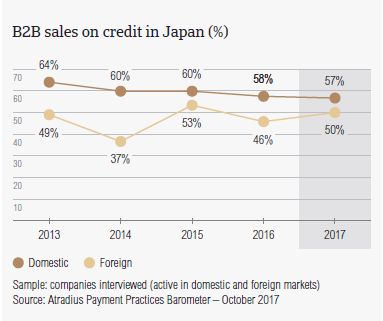
- The average percentage of domestic B2B sales on credit made by respondents in Japan did not change much year-on-year. On average, 57.1% of domestic B2B sales were made on credit this year compared to 57.7% in 2016.
- In contrast, the average percentage of B2B sales on credit to foreign B2B customers increased from 46.3% in 2016 to 50.3% this year.
- Compared to averages for Asia Pacific overall (domestic: 49.5%; foreign: 42.2%), respondents in Japan seem far more inclined to sell on credit terms to both their domestic and foreign B2B customers.
- Despite an increase in the percentage of B2B sales on credit to their foreign B2B customers, Japanese respondents seem more likely to sell on credit terms to their domestic B2B customers.
Overdue B2B invoices (%)
Of the Asia Pacific countries surveyed, Japan had the lowest percentage of respondents reporting having experienced late payments by their B2B customers. Moreover, the average percentage of past due B2B invoices in Japan is the lowest in the region.
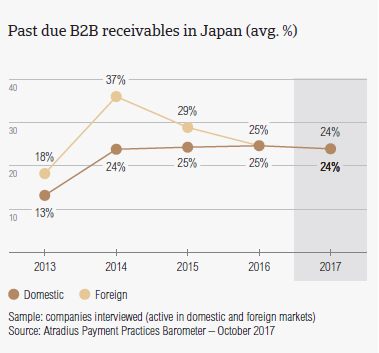
- Similarly to what was observed in 2016 (domestic: 57.4%; foreign: 67.3%), Japan had the lowest percentages of respondents reporting late payment from their domestic and foreign B2B customers. However, in 2017, these percentages increased to 67.3% of respondents who reported domestic late payments and 74.7% of respondents who reported foreign late payments. Well below the regional averages of 89.6% from domestic and 88.8% from foreign B2B customers.
- On average, 23.7% of domestic and 23.5% of foreign B2B invoices remained unpaid past the due date. Both these percentage are the lowest registered in the region and far below the averages reported in Asia Pacific overall (domestic: 44.6%; foreign: 46.1%).
- In 2017, Japan’s Days Sales Outstanding (DSO) figure is 43 days on average. This is two days longer than in 2016 and slightly above the regional average DSO of 40 days.
- Most respondents in Japan (82.8%) do not expect a change in their average DSO over the coming 12 months. Of those expecting a change, 8.9% foresee a slight decrease while 6.3% expect a slight increase.
Payment duration (average days)
In 2017, the average payment duration in Japan is 55 days – the same as the regional average. The payment duration experienced by Japanese respondents was consistent with that in 2016 (average: 56 days) suggesting no change in the time it takes respondents to convert credit into cash. At regional level, however, a minor improvement was observed from the average of 59 days registered in 2016.
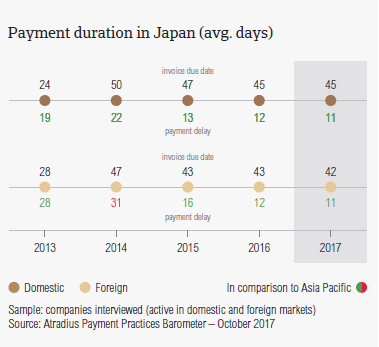
- In 2017, the payment terms given to domestic B2B customers are 45 days on average and did not change compared to one year ago.
- Japanese respondents gave their foreign B2B customers slightly shorter average payment terms. In 2017, foreign B2B customers had, on average, 42 days to settle their invoices (compared to 43 days in 2016).
- This however is much longer the average payment terms for the Asia Pacific the region overall (domestic: 29 days; foreign: 30 days).
- Domestic and foreign B2B customers of suppliers in Japan seem to pay their overdue invoices faster than their peers in Asia Pacific. More specifically, overdue invoices are paid, on average, 11 days from the due date (one day shorter than in 2016). At regional level, domestic B2B customers paid overdue invoices, on average 24 days late and foreign B2B customers, on average, 25 days late.
Key payment delay factors
The main reasons for domestic and foreign payment delays in Japan are the same as those reported at regional level. However, they were cited by a lower percentage of respondents in Japan than in Asia Pacific overall.
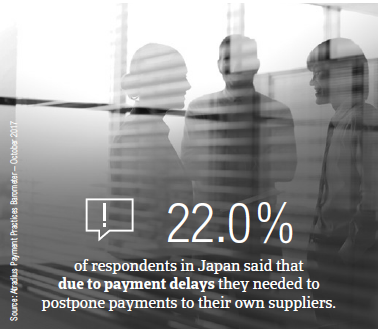
- The main reason for domestic payment delays in Japan is insufficient availability of funds (cited by 35.9%). This was followed by buyers using outstanding invoices as a form of financing (cited by 25.0%).
- At regional level, insufficient availability of funds is also the main reason for domestic and foreign payment delays – reported by 43.8% of respondents. The second most cited reason for domestic payment delays is the complexity of the payment procedure (cited by 27.4% of respondents).
- Foreign payment delays in Japan seem to occur mainly because of the complexity of the payment procedure (cited by 33.3%) and insufficient availability of funds (31.7%). The same top two reasons for foreign payment delays were reported in Asia Pacific (complexity of the payment procedure: 34.9%; insufficient availability of funds: 33.3%).
- 47.7% of respondents in Japan said that overdue B2B invoices did not have an impact on their businesses. This is the highest percentage of respondents reporting this in Asia Pacific. Of those who reported having experienced changes, 22.0% said that due to late payments, they needed to postpone payments to their own suppliers. 12.8% of respondents stated that due to overdue B2B invoices, they needed to pursue additional financing (from banks, factors, others).
Protection of business profitability
Respondents in Japan are the least likely respondents in the Asia Pacific region to increase protection against risks stemming from Brexit, US protectionism and the slowdown in Asia.
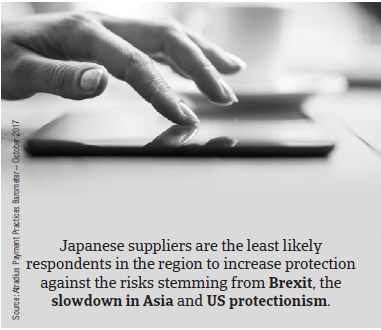
- 49.7% of survey respondents in Japan stated that they would not make changes to their credit management programmes in the face of Brexit, US protectionism and the slowdown in Asia. This is the highest percentage in Asia Pacific; much higher than the regional average of 39.8%.
- At the same time, Japan had the lowest percentage of respondents (12.6%) who plan to do more to protect their businesses from risks stemming from the above mentioned developments. This is far below the average percentage reported in Asia Pacific overall (30.3%).
- Should they add to their current mix of credit management practices, respondents in Japan are most likely to increase monitoring of their buyers’ credit risk (18.8%) and increase checks on their buyers’ creditworthiness (17.2%). In Asia Pacific overall these were also the most selected actions; increasing checks on buyers’ creditworthiness (36.1%) and increasing monitoring of buyers’ credit risk (34.0%).
- The slowdown in China and the risks stemming from US protectionism seem to worry Japanese suppliers the most. To increase protection they plan on increasing creditworthiness checks (21.7% of respondents stated this about the slowdown in China and 15.0% in regards to US protectionism) and increasing monitoring of buyers’ credit risk (19.6% of respondents stated this about the slowdown in China and 20.0% about US protectionism).
- Suppliers in Japan seem to be the least worried about risks stemming from Brexit. Still, 16.8% of respondents said that they will increase monitoring of their buyers’ credit risk and 14.9% that they will increase creditworthiness checks to protect against Brexit related payment risks.
Uncollectable receivables
Similarly to what was observed in 2016, the total value of B2B receivables written off as uncollectable in Japan is the lowest in the Asia Pacific region.
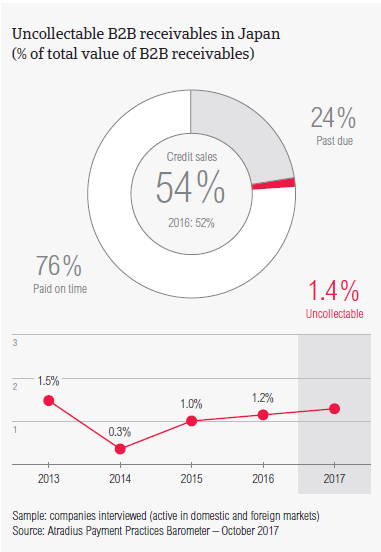
- There was a minor increase in the total value of B2B receivables written off as uncollectable in Japan; from 1.2% in 2016 to 1.4% this year. However, Japan still has the lowest percentage of uncollectable receivables in the region, far below the regional average of 2.1%.
- n 2017, domestic receivables were written off as uncollectable more often than foreign ones (domestic: 1.2%; foreign: 0.2%), in both cases, slightly more than in 2016 (domestic: 1.1%; foreign: 0.1%)
- Uncollectable receivables in Japan originated most often from B2B customers in the consumer durables, business services and services sectors.
- 44.9% of respondents in Japan said that the main reason why B2B receivables were written off as uncollectable was the customer going bankrupt or out of business. Other reasons why B2B receivables were uncollectable were the old age of the debt (34.8% of respondents) and the inability to locate the customer (26.9%).
Payment practices by industry
Looking ahead, more respondents in Japan expect a slight deterioration than an improvement in the payment behaviour of their domestic and foreign B2B customers.
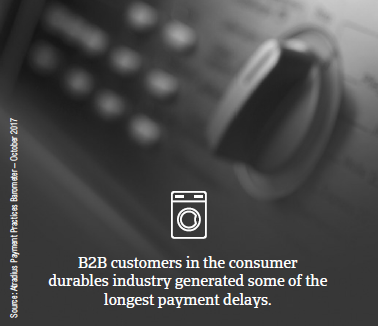
- In addition to offering some of the most lenient payment terms in the region, suppliers in Japan gave their B2B customers in the consumer durables industry and those in the metals sector payment longer than average payment terms for the country. B2B customers in each of these sectors had, on average, 51 days to fulfil their payment obligations; one week longer than the country average.
- B2B customers in the services sector were given the shortest payment terms, on average, 27 days.
- Suppliers in Japan reported that customers in the chemicals and consumer durables sectors were some of the slowest payers. B2B customers in these sectors, paid on average 20 and 19 days after the due date.
- Payment delays from B2B customers in the chemicals sector seem to occur most often due to insufficient availability of funds (as reported by 30.0% of respondents).
- The most frequently reported reason for payment delays in the consumer durables sector was also insufficient availability of funds (cited by 47.0% of respondents). 42.0% of respondents said that the second most often used reason for payment delays was the formal insolvency of the buyer.
Relaterede dokumenter

3.35MB PDF

